- December 20, 2023
My Cat Brought Me a Mouse, What Should I Do?
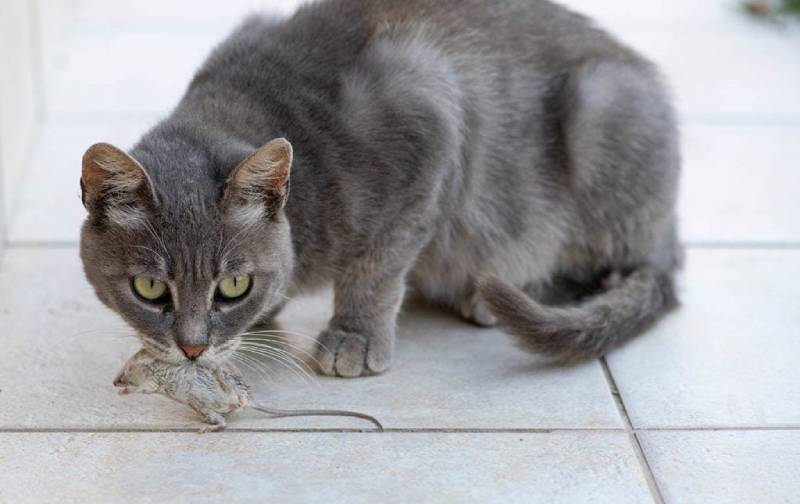
If you find yourself in a situation where your cat has brought you a mouse, it’s important not to panic. This is perfectly normal behavior for cats, even if it can be a little unsettling for us humans. Your cat isn’t trying to upset you – on the contrary! They’re likely displaying their hunting instincts or even showing affection.
What to Do If Your Cat Brings You a Mouse
Stay Calm
If your cat presents you with a mouse, your first reaction might be to freak out. However, it’s essential to remain calm. Remember, your cat isn’t trying to upset you or make a mess. Instead, they’re following their natural instincts or trying to show you affection. They don’t understand that you might find their gift unpleasant.
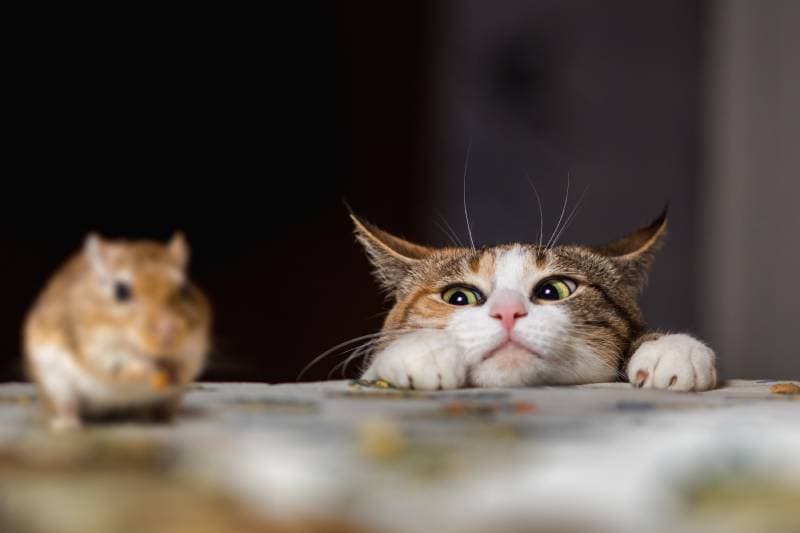
Don’t Punish Your Cat
It’s crucial not to punish your cat for bringing you a mouse. They’re simply acting on their natural instincts and punishing them could confuse them or damage your relationship. Your cat won’t understand why they’re being punished for something that, in their eyes, should be rewarded. Instead of punishment, try to redirect their energy towards toys and playtime.
Thank Them Gently
While you don’t want to encourage the behavior, it’s important to acknowledge your cat’s hard work. A simple, gentle “thank you” will suffice. This can help maintain your bond with your cat without necessarily encouraging more hunting.
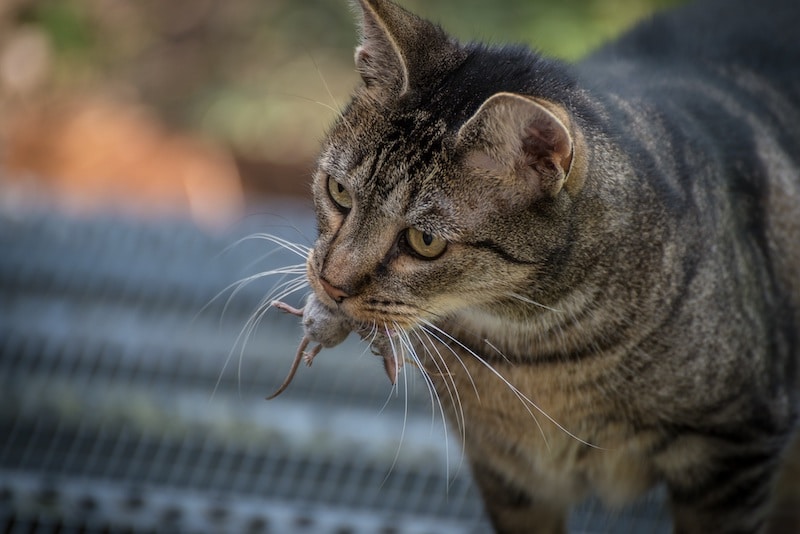
What to Do With the Mouse
If the Mouse Is Alive…
If the mouse is still alive when your cat brings it to you, try to trap it if possible. You can use a towel or blanket to catch the mouse, then gently release it outside, far away from your home to prevent it from returning.
If the Mouse Is Dead…
If the mouse is already dead, use gloves to remove it to avoid any potential diseases or parasites the mouse might be carrying. Dispose of it safely by placing it in a bag and putting it in the trash.
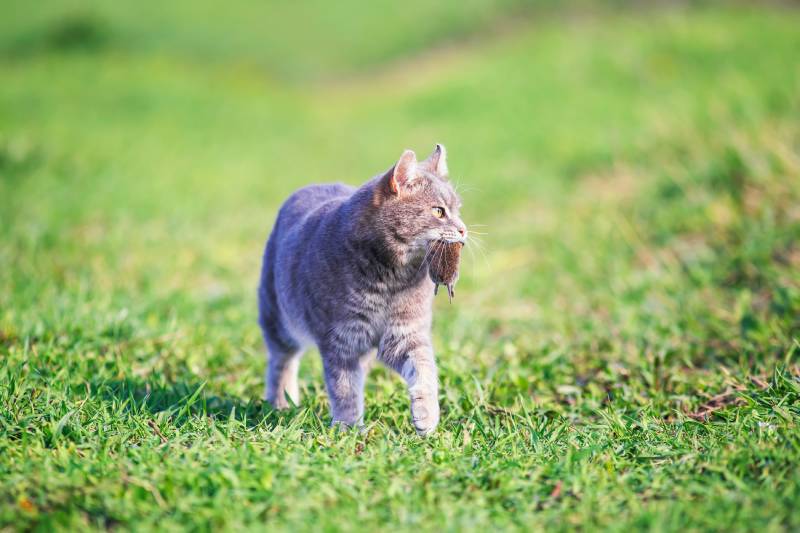
Preventing Future Hunting
Keep Your Cat Indoors
One of the most effective ways to reduce hunting behavior is by keeping your cat indoors, particularly at dawn and dusk when mice are most active. This can significantly decrease their opportunities to hunt.
Provide Entertainment
Ensure your cat has plenty of toys and stimulation indoors to distract them from hunting. Interactive toys, puzzle feeders, and regular playtime can help satisfy their hunting instincts in a safer and cleaner way.
Use Bells on Collars
Another strategy is to use a bell on your cat’s collar. The sound of the bell can warn potential prey of their approach, giving them a chance to escape before your cat can catch them. This can reduce the number of successful hunts, and subsequently, the number of ‘gifts’ you receive.
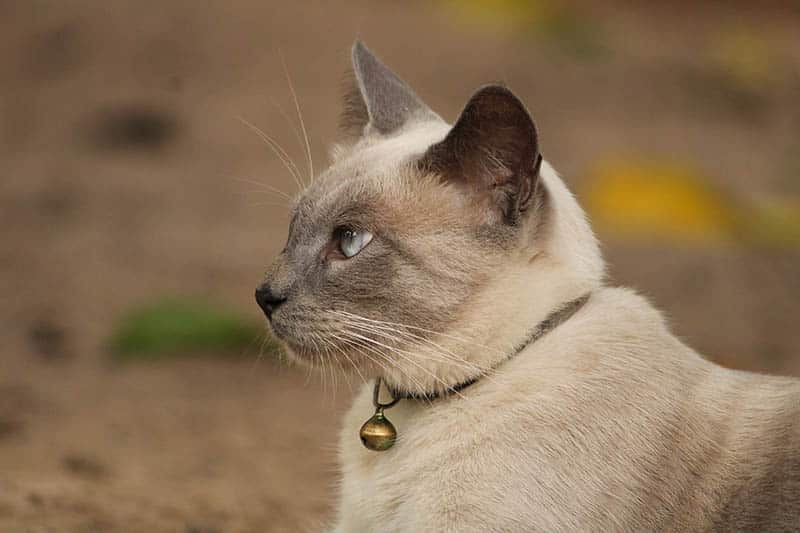
Tips to Prevent Your Cat from Bringing You Mice
You can’t keep both eyes on your cat all day, so here are some tips to help keep the dead mice off your doorstep.
- Keep your cat indoors, particularly at dawn and dusk when mice are most active.
- Provide plenty of toys and stimulation to satisfy their hunting instincts in a safer way.
- Use a bell on their collar to warn potential prey of their approach.
- Regularly check your home for any cracks or holes that could allow mice to enter.
- Keep your yard and home clean and tidy to help deter mice from entering the area.
- Don’t allow your cat to eat any mice they catch as this could potentially be dangerous for them.
- If your cat gets sick after eating a mouse, contact your vet immediately.
- Neutering or spaying won’t necessarily reduce hunting behaviors in cats.
The Hunting Instinct
Cats are natural hunters, a trait that’s been ingrained in them from their wild ancestors. This instinct doesn’t disappear just because they live indoors or are well-fed. Hunting is more than just a way to get food for cats; it’s also an important part of their behavior that allows them to express their natural instincts and keep their skills honed. Even when provided with plenty of food, cats might still hunt for sport, practicing their skills and keeping themselves mentally and physically stimulated. It’s an activity that involves stalking, pouncing, and playing with their prey, which cats find incredibly entertaining.
Affectionate Gestures
Another reason cats often bring their owners “gifts” like mice is as a sign of affection. In the wild, mother cats teach their kittens how to eat by bringing home dead or injured prey. Your cat might see you as part of their family and feel the need to share their successful hunt with you. It’s a way for them to take care of you, show you that they trust you, and even try to teach you to hunt. While this behavior can be a bit gruesome, it’s a significant compliment in the world of cats.
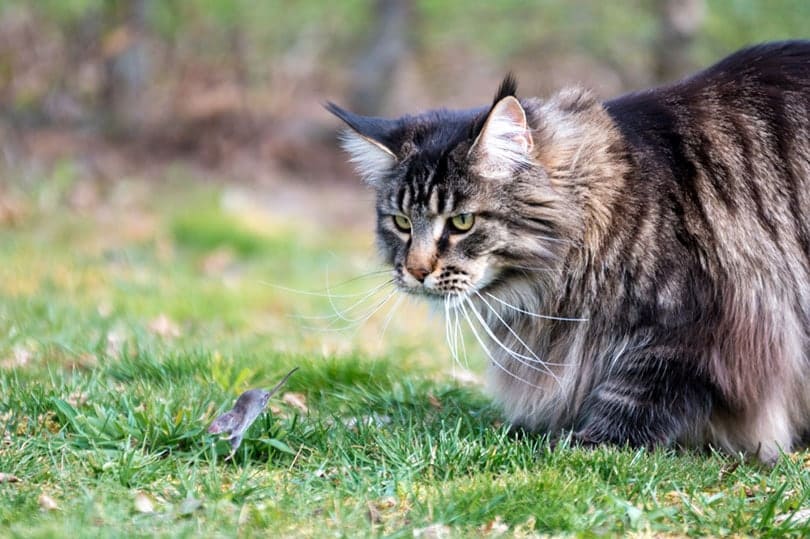
Other FAQs
Q: Why do cats hunt, even when they’re not hungry?
A: Cats hunt due to their natural instincts, not necessarily because they’re hungry. They are predators and hunting allows them to express these instincts and keep their skills sharp.
Q: My cat is well-fed. Why does it still hunt?
A: Even well-fed cats will often engage in hunting behavior. This is due to their instinctual drive to hunt and doesn’t necessarily indicate that they are hungry.
Q: Is it safe for my cat to eat a mouse?
A: While cats are capable of eating mice, it’s not always safe. Mice can carry diseases and parasites which could potentially be harmful to your cat.
Q: Can I train my cat to stop hunting?
A: It’s challenging to train a cat to stop hunting completely as it’s a natural instinct. However, you can provide alternative forms of stimulation to help reduce the behavior.
Tags
What do you think?
Related Articles

New Puppy Checklist: Gear You’ll Need for Your New Dog
Getting a new puppy is really exciting, but before you welcome them home, it’s important to prepare your space for them. Since puppies need a

How Big Do Mini Poodles Get? Vet Reviewed Average Weight & Growth Chart – Dogster
The information is current and up-to-date in accordance with the latest veterinarian research. Learn more » When you buy a Miniature Poodle, you might not

Can Police Dogs Smell Nicotine? Vet Verified Facts & Info – Dogster
The information is current and up-to-date in accordance with the latest veterinarian research. Learn more » While cigarette sales have been declining steadily for decades,

How Old Is 5 in Dog Years? Vet-Approved Guide to Each Size of Dog – Dogster
The information is current and up-to-date in accordance with the latest veterinarian research. Learn more » A common method for calculating a dog’s age is

